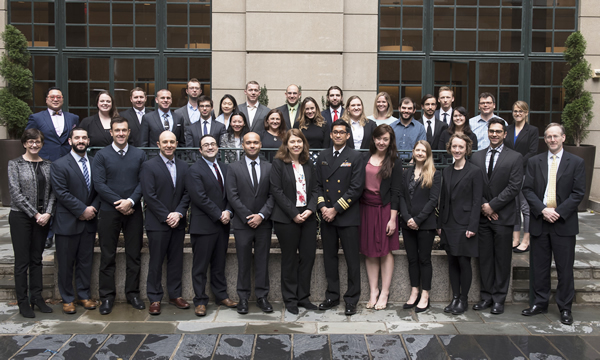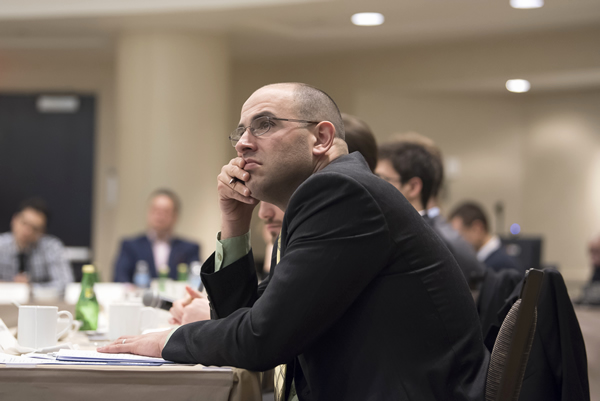USAMMDA Product Manager Groomed to Become a Leader in Biosecurity

The specialized staff that makes up the U.S. Army Medical Materiel Development Activity may surprise you. Like the fact that one employee is one of 28 people in the world engaging in a unique biosecurity learning experience. Over the next several months, Lt. Col. Carl Soffler will be participating in The Emerging Leaders in Biosecurity Initiative Fellowship Program, run out of Johns Hopkins Bloomberg School of Public Health, Center for Health Security. Soffler says he plans to apply what he learns at the highly competitive fellowship to his role as a product manager in the Pharmaceutical Systems Project Management Office at USAMMDA.
The ELBI fellowship allows participants to network with each other, alumni and biosecurity leaders. During the program, the fellows engage in deep discussions and learn how to deal with biosecurity issues. The program connects people that have an interest in biosecurity or have a way to influence and build policy. Essentially, the program aims to build future leaders who are equipped to handle biosecurity issues, whether that be in the realm of bioterrorism, intentional or accidental naturally occurring agent-related events, or food security – containing anything that would endanger public health.
"The term biosecurity is ever evolving," said Soffler. "For USAMMDA specifically, a lot of what we do is protecting the Warfighter. I see that as part of health security. I want to bring a military perspective to the table during discussions at the fellowship."
This year, the fellowship held their first meeting in Washington, D.C., in early March. The fellows came from all over the country, some from Canada and others from the United Kingdom. So far, the fellows met members of the National Security Council, Department of Health and Human Services, and participants saw firsthand the places where biosecurity has a role in government.

"It's an honor to be part of the fellowship. It's a way to really connect to a diverse group of people that have a similar focus of interest in biosecurity. I want to broaden my perspective about the subject. There's a lot of different views, and it's interesting to hear one perspective next to another," said Soffler. Soffler applied to be part of the class of 2017 when he was working as a veterinarian at the U.S. Army Medical Research Institute of Infectious Diseases. Soffler was accepted into the program, and although he had to defer a year due to other obligations, the program held a spot for him until 2018.
Soffler's interest in biosecurity started when he worked as a veterinarian. As an internal medicine resident at a veterinary teaching hospital, the biosecurity focus was on preventing nosocomial (hospital acquired) infections in veterinary patients. During his doctoral work and time at USAMRIID, the biosecurity focus was on safely working with bacterial select agents – protecting personnel that work in the lab as well as ensuring all agents stay accounted for within biocontainment. After working for USAMRIID for almost four years, he came to USAMMDA in the summer of 2017.
Soffler said although he has taken on a new government role since he last applied for the program, what he learns at the fellowship can still be a positive influence in his workplace. Some topics of discussion at the fellowship include the leading issues in biosecurity, where leaders' concerns should be placed and how experts should direct their efforts.
"We're constantly in this state of prioritizing our funding, which is probably the biggest hurdle for everyone. Which priority do we fund and to what extent? That's why it's important to hear the perspectives of what people think is important during our group discussions," said Soffler.
This year's fellowship goes through the end of September. The final event will be held in the United Kingdom, and Soffler hopes to attend.
"I hope to take away a better understanding of how the broader biosecurity policies are made and shaped. A lot of my interactions with biosecurity have been on a local level to the hospital or individual lab," said Soffler. "Policies often develop so many levels above where we are. When you understand how these things came to be, it's easier to understand how to deal with them; and if they need to be changed, understand what needs to go into that. As opportunities arise to help influence that policy, I will be better situated to do so."
Once he completes the fellowship, Soffler will be part of the program's ever-growing alumni network of fellows. Soffler is the only USAMMDA representative at this year's fellowship. He said the connections he makes, and the experience as a whole, will help him better influence biosecurity situations in the future.













